News
Jonathan Promises People-based Constitution …Names Dagogo-Jack Power Task Force Chair
As part of the ongoing constitution amendment process, President Goodluck Jonathan yesterday assured that the report of the former Chief Justice of Nigeria, Justice Alfa Belgore Committee on past constitutional conferences would soon be forwarded to the National Assembly alongside the proposed bills.
Speaking at the first Presidential Retreat for Civil Society Organisations and Professional Association as part of the 52nd Independence Anniversary of the country, Jonathan promised to deliver a people-oriented constitution that would ensure development of the country, while the contribution of the people will be considered in the amendment processes.
Arguing that a constitution must originate from the people and bear clear imprint of their contributions, the president said government was engaging the civil society in the constitution review process because of the tremendous knowledge of constitutional review borne out of many years of consistent effort to craft a people’s constitution for the country.
Besides, Jonathan said the essence of the engagement was to galvanize the views of the people through the civil society groups, who he said, were the voice of the people, hence, the engagement should not be seen as a political settlement.
According to him, his government believes in the rule of law, adding that it was in furtherance of his commitment to leave a people-oriented constitution that in November last year, the Presidential Committee on the Review of Outstanding Issues in recent Constitutional Conferences was set up.
The committee’s mandate was to reaffirm or re-assess issues on which there is evidence of national consensus from past constitutional conferences; and to highlight those areas that would require further consultations so that a wider forum could look at them and reach agreements.
Jonathan said, “I assure you that we shall shortly send the report alongside the proposed bills to the National Assembly.”
“I believe that a constitution worthy of our efforts must originate from the people themselves and bear clear imprint of their contributions.
“Constitution-making or review in a democracy should not be an elitist undertaking. It must be processed through a strategic and far reaching consultation with the people. That is the spirit of democracy.
In his remarks, the chairman of the occasion and retired Chief Justice of Nigeria, Justice Alfa Belgore, described Nigeria’s constitution as the most battered in the world.
He also faulted the modelling of the 1999 Constitution after that of America without considering our peculiar values and traditions.
The presidential system, however, makes the president the chief executive with his ministers not being members of the parliament. In some cases, the ministers contested for parliamentary election and failed.
However, the greatest fault in presidential system is the expense. Apart from unelected ministers, there are so many special assistants. The country seems to be mimicking countries like United States in this arrangement. We seem to be the only country in the Commonwealth of Nations that attempts to copy the United States system.
“The greatest problem with Nigeria is, its constant internal instability in governance.
“The constitution is the mother of all the laws and there is enough for everybody on the ground. There will be no excuse for any Nigerian to be poor.”
The Secretary to the Government of the Federation, Senator Anyim Pius Anyim in his opening remark, described the civil society as the fifth estate of the realm, saying, government decided to bring them together because of the significant role they play which has made them indispensable in the process of social engineering.
The President appointed, Mr Reynolds Dagogo-Jack of National Intergrated Power Project (NIPP) as the Chairman of the reconstituted Presidential Task Force on Power.
The body was hitherto chaired by the former Minister of Power, Prof Barth Nnaji, who resigned his appointment on ground of conflict of interest.
“We have done it this way because, the other time when Nnaji was the Chairman, the secretary was my special adviser; so there was a lot of conflict between two of them because they say two captains cannot drive a ship.
“This time around we just want one captain and others will work with him.’’
Members of the task force include Messrs Rumundakaa Wonodi, Olusola Akinniranye and Abdulganiyu Umar, the managing directors and chief executive officers of Nigeria Bulk Electricity Trading Plc; Transmission Company of Nigeria; and Abuja Electricity Distribution Company respectively.
Others are Mr Paul Umunna and Mr Oladele Amoda, the chief executive officers of Ugheli Power Plc and Eko Electricity Distribution Company respectively, as well as the Managing Director of Niger Delta Power Holding Company, Mr James Olotu.
The MD of the Nigerian Gas Company, Mr Saidu Mohammed and the CEO of Geregu Power Plc, Mr Adeyemi Adenuga, are also members of the task force.
The Permanent Secretary in the Ministry of Power, Dr Dere Awosika, will serve as the Secretary of the task force.
In the same vein, the president has inaugurated the reconstituted, the Presidential Action Committee on Power will be chaired by Jonathan with Vice President Namadi Sambo as Deputy Chairman.
Members of the committee are the Secretary to the Government of the Federation, Sen. Anyim Pius Anyim; the Head of Civil Service of the Federation, Alhaji Ali Sali; and the Chief of Staff to the President, Mr Mike Oghiadome.
The Attorney General of the Federation and Minister of Justice, Mr Mohammed Adoke; Minister of Finance, Dr, Ngozi Okonjo-Iweala; and Minister of Labour and Productivity, Mr Emeka Wogu, are members.
Some other members of the committee are Minister of Petroleum Resources, Mrs Diezzani Allison Madueke; Minister of National Planning, Dr Shamsudeen Usman; and the chief economic adviser to the President.
The special adviser to the President on Performance Monitoring and Evaluation; the directors-general of the Bureau of Public Enterprises and Bureau of Public Procurement are also members of the committee.
Others are the group managing director of NNPC and the Chairman of the National Electricity Regulatory Commission.
It would be recalled that the president, on June 21, relieved the former Minister of Defence, Dr Haliru Bello of his appointment.
The President is expected to name replacements for Haliru and Nnaji, who while in office, represented Kebbi and Enugu States in the cabinet respectively.
News
You Failed Nigerians, Falana Slams Power Minister
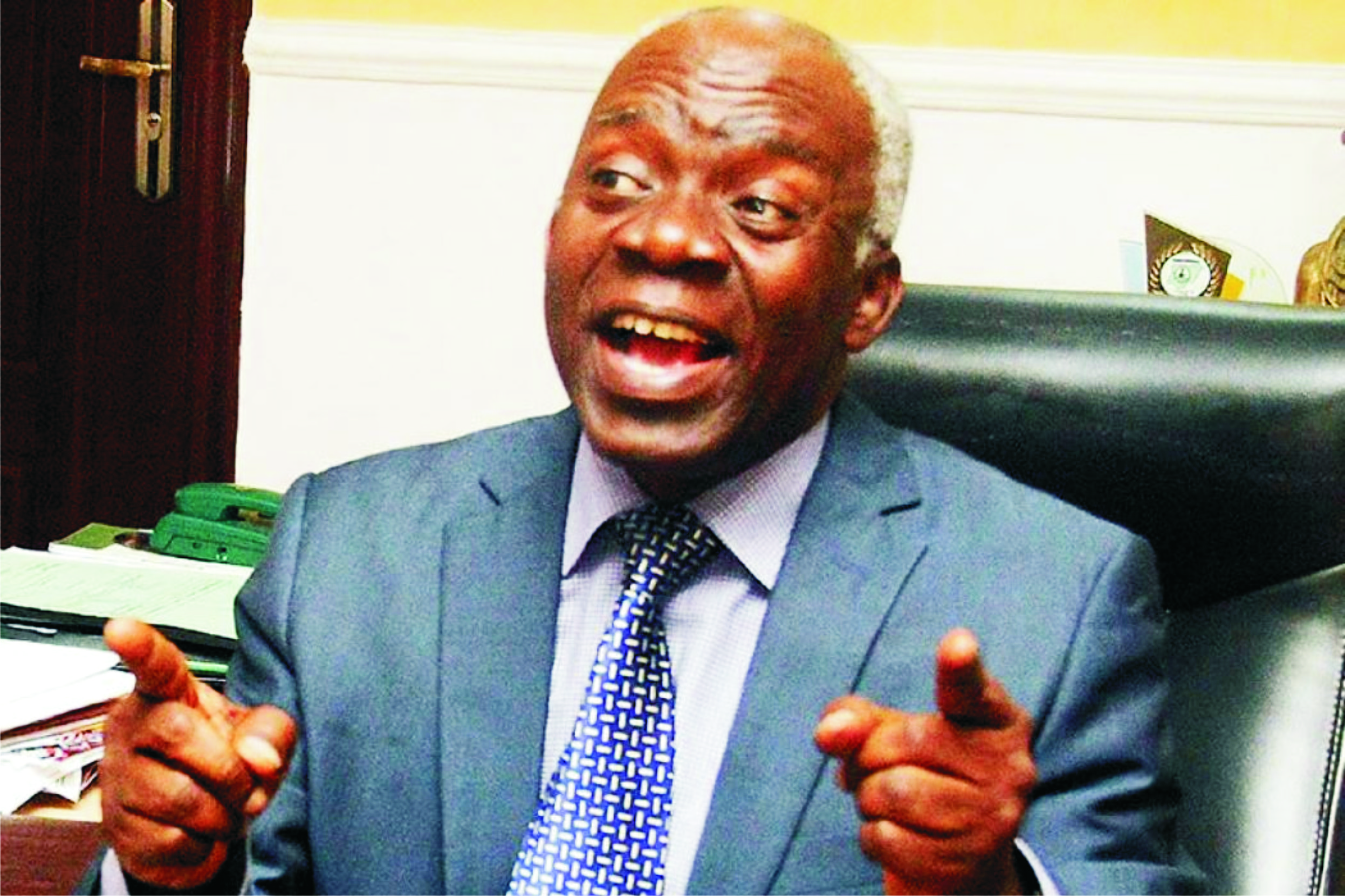
Human rights lawyer, Femi Falana, SAN, has passed a vote of ‘no confidence’ in the Federal Government, saying that the Minister of Power, Adebayo Adelabu, has failed Nigerians.
Falana was reacting to Adelabu’s appearance before the Senate to defend the increase in the electricity tariff and what Nigerians would pay on Monday.
The rights activists also claimed that the move is a policy imposed on the Nigerian government by the International Monetary Funds (IMF) and the World Bank.
Speaking on the Channels TV show on Monday night, Falana said, “The Minister of Power, Mr Adebayo Adelabu has failed to address the question of the illegality of the tariffs.
“Section 116 of the Electricity Act 2023 provides that before an increase can approved and announced, there has to be a public hearing conducted based on the request of the DISCOS to have an increase in the electricity tariffs. That was not done.
“Secondly, neither the minister nor the Nigeria Electricity Regulatory Commission has explained why the impunity that characterised the increase can be allowed.”
Falana also expressed worry over what he described as impunity on the part of the Federal Government and electricity regulatory commission.
““I have already given a notice to the commission because these guys are running Nigeria based on impunity and we can not continue like this. Whence a country claims to operate under the rule of law, all actions of the government, and all actions of individuals must comply with the provisions of relevant laws.
“Secondly, the increase was anchored on the directives of the commission that customers in Band A will have an uninterrupted electricity supply for at least 20 hours a day. That directive has been violated daily. So, on what basis can you justify the increase in the electricity tariffs”, Falana queried.
The human rights lawyer alleged that the Nigerian government is heeding an instruction given to her by the Bretton Wood institutions.
He alleged, “The Honourable Minister of Power is acting the script of the IMF and the World Bank.
“Those two agencies insisted and they continue to insist that the government of Nigeria must remove all subsidies. Fuel subsidy, electricity subsidy and what have you; all social services must be commercialised and priced beyond the reach of the majority of Nigerians.
“So, the government cannot afford to protect the interest of Nigerians where you are implementing the neoliberal policies of the Bretton Wood institutions.”
The Senior Advocate of Nigeria accused Western countries led by the United States of America of double standards.
According to him, they subsidize agriculture, energy, and fuel and offer grants and loans to indigent students while they advise the Nigerian government against doing the same for its citizens.
Following the outrage that greeted the announcement of the tariff increase, Adelabu explained that the action would not affect everyone using electricity as only Band A customers who get about 20 hours of electricity are affected by the hike.
Falana, however, insisted that neither the minister nor the National Electricity Regulatory Commission (NERC) has justified the tariff increase.
The senior lawyer said that Nigerian law gives no room for discrimination against customers by grading them in different bands.
He insisted that the government cannot ask Nigerians to pay differently for the same product even when what has been consistently served to them is darkness.
Following the outrage over the hike, Adelabu on Monday appeared at a one-day investigative hearing on the need to halt the increase in electricity tariff by eleven successor electricity distribution companies amid the biting economic situation in Nigeria.
However, Falana said that nothing will come out of the probe by the Senate.
He advised that the matter has to be taken to court so that the minister and the Attorney General of the Federation can defend the move.
News
1.4m UTME Candidates Scored Below 200 -JAMB
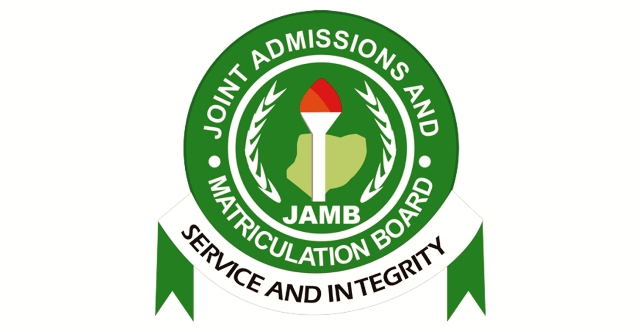
The Joint Admissions and Matriculation Board (JAMB) on Monday, released the results of the 2024 Unified Tertiary Matriculation Examination, showing that 1,402,490 candidates out of 1,842,464 failed to score 200 out of 400 marks.
The number of candidates who failed to score half of the possible marks represents 78 per cent of the candidates whose results were released by JAMB.
Giving a breakdown of the results of the 1,842,464 candidates released, the board’s Registrar, Prof. Ishaq Oloyede, noted that, “8,401 candidates scored 300 and above; 77,070 scored 250 and above; 439,974 scored 200 and above while 1,402,490 scored below 200.”
On naming the top scorers for the 2024 UTME, Oloyede said, “It is common knowledge that the Board has, at various times restated its unwillingness to publish the names of its best-performing candidates, as it considers its UTME as only a ranking examination on account of the other parameters that would constitute what would later be considered the minimum admissible score for candidates seeking admission to tertiary institutions.
“Similarly, because of the different variables adopted by respective institutions, it might be downright impossible to arrive at a single or all-encompassing set of parameters for generating a list of candidates with the highest admissible score as gaining admission remains the ultimate goal. Hence, it might be unrealistic or presumptive to say a particular candidate is the highest scorer given the fact that such a candidate may, in the final analysis, not even be admitted.
“However, owing to public demand and to avoid a repeat of the Mmesoma saga as well as provide a guide for those, who may want to award prizes to this set of high-performing candidates, the Board appeals to all concerned to always verify claims by candidates before offering such awards.”
Oloyede also noted that the results of 64,624 out of the 1,904,189, who sat the examination, were withheld by the board and would be subject to investigation.
He noted that though a total of 1,989,668 registered, a total of 80,810 candidates were absent.
“For the 2024 UTME, 1,989,668 candidates registered including those who registered at foreign centres. The Direct Entry registration is still ongoing.
“Out of a total of 1,989,668 registered candidates, 80,810 were absent. A total of 1,904,189 sat the UTME within the six days of the examination.
“The Board is today releasing the results of 1,842,464 candidates. 64,624 results are under investigation for verification, procedural investigation of candidates, Centre-based investigation and alleged examination misconduct”, he said.
Oloyede also said the Board, at the moment, conducts examination in nine foreign centres namely: Abidjan, Ivory Coast; Addis Ababa, Ethiopia; Buea, Cameroon; Cotonou, Republic of Benin; London, United Kingdom; Jeddah, Saudi Arabia; and Johannesburg, South Africa.
“The essence of this foreign component of the examination is to market our institutions to the outside world as well as ensuring that our universities reflect the universality of academic traditions, among others. The Board is, currently, fine-tuning arrangements for the conduct of the 2024 UTME in these foreign centres,” he explained.
News
Ex-CBN Director Admits Collecting $600,000 Bribe For Emefiele
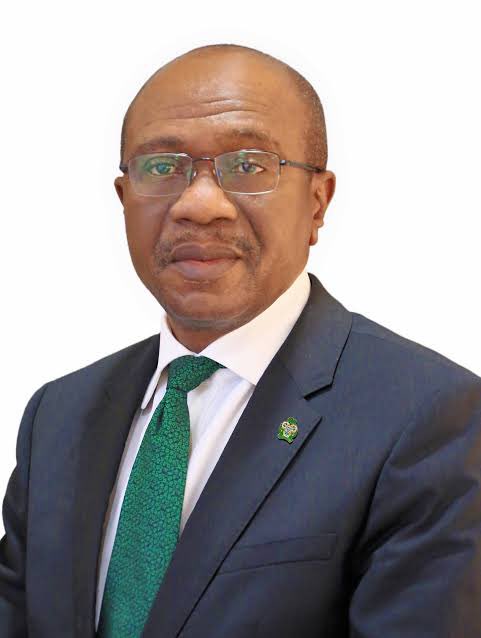
A former Director of Information Technology with the Central Bank of Nigeria, John Ayoh, has alleged that he collected on behalf of the former governor of the apex bank, Godwin Emefiele, a sum of $600,000 in two installments from contractors.
Ayoh, the second witness of the Economic and Financial Crimes Commission (EFCC), disclosed this on Monday while recounting instances where he facilitated the delivery of money to Emefiele, claiming it was for contract awards.
Under cross-examination at the Ikeja Special Offences Court in Lagos by the defence counsel, Olalekan Ojo (SAN), Ayoh admitted to facilitating the alleged bribery under pressure.
The embattled former governor of the apex bank is having many running legal battles both in Abuja and Lagos and is being tried by the EFCC at the Special Offences Court over alleged abuse of office and accepting gratification to the tune of $4.5 billion and N2.8bn.
He was arraigned on April 8, 2024, alongside his co-defendant, Henry Isioma-Omoile, on 26 counts bordering on abuse of office, accepting gratifications, corrupt demand, receiving property, and fraudulently obtaining and conferring corrupt advantage.
Emefiele’s defence, however, challenged the court’s jurisdiction over constitutional matters, urging the quashing of counts one to four and counts eight to 24 against him.
Ayoh, who was led in evidence by the EFCC prosecution counsel, Rotimi Oyedepo (SAN), said the first money he collected on Emefiele’s behalf was $400,000 which his assistant, John Adetola, came to collect at his house in Lekki, Lagos State.
He further told the court that the second bribe of $200,000 was collected at the headquarters of CBN, at the Island office.
He said the money was brought in an envelope, adding that when the delivery person, Victor, was on the bank’s premises, he contacted Emefiele, who insisted on receiving the package directly from Ayoh without involving third parties.
He said when he went to deliver the package, he saw many bank CEOs waiting to see the former apex bank governor.
When questioned if he had ever been involved in any criminal activity, he responded in the negative but admitted that he had facilitated the commission of crime unknowingly.
“I believe I did admit in my statement that I was forced to commit the crime. I don’t know the exact word I used in my statement, but I said we were all forced with tremendous pressure to bend the rules,” he said.
When asked if he opened the envelopes he collected on the two occasions and counted the money to confirm the amount, he was negative in his reply, adding that he did also write in his statement that the money was given to influence the award of contracts.
On whether the EFCC arrested him, the witness said he was invited on February 20, 2024, and returned home after he was granted bail.
Earlier, Emefiele asked the court to quash counts one to four and counts eight to 24 against him, as the court lacks the jurisdiction to try him.
Speaking through his counsel, Ojo, he said counts one to four were constitutional matters, which the court lacked the jurisdiction to determine.
In his argument, citing Sections 374 of the Administration of Criminal Justice Act and 386(2), the defence counsel told Justice Rahman Oshodi that Emefiele ought not to be arraigned before the court on constitutional grounds.
He, therefore, urged the court to resolve the objection on whether the court had the jurisdiction to try the case or not.
The second defendant’s counsel, Kazeem Gbadamosi (SAN), also relied on the submissions of Ojo.
The EFCC counsel, Oyedepo, however, objected, as he asked the court to disregard the decision of the Court of Appeal relied upon by Ojo, saying that the Court of Appeal could not set aside the decision of the Supreme Court on any matter.
Ruling on the submissions of the counsel, Justice Oshodi said he would give his decision on jurisdiction when he delivered judgment as he adjourned till May 3.
He also directed the EFCC to serve the defence proof of evidence on witness number six and his extrajudicial statement.
-
News3 days ago
FG Flags Off PH-Aba Train Service
-
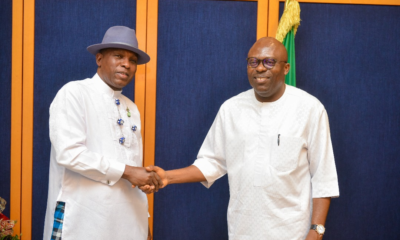
 Featured3 days ago
Featured3 days agoDraw Up Futuristic Policies To Strengthen Governance, Fubara Tells NISS Team …Says Rivers’ll Deploy AI To Drive Dev, Tackle Political Crisis
-
News3 days ago
Drama As Senators Jostle For Seats In Newly Renovated Chamber
-
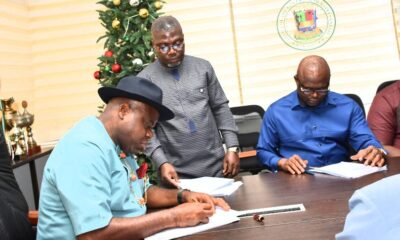
 Niger Delta3 days ago
Niger Delta3 days agoDiri swears in 14 Commissioners, Revenue Chairman
-

 Nation3 days ago
Nation3 days agoVCDF in Partnership with LDSVA Sensitise Women on Gender Equality, Financial Literacy & Entrepreneurship
-
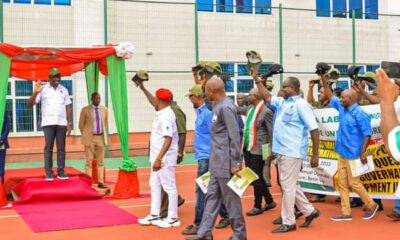
 Niger Delta3 days ago
Niger Delta3 days agoObaseki Approves N70,000 Minimum Wage For Workers
-
Niger Delta3 days ago
Ministry Of Health Decorates Odu As End Malaria Champion In Rivers
-

 Niger Delta3 days ago
Niger Delta3 days agoGroup Dismisses Call For NDDC MD’s Sack … Passes Confidence Vote.

